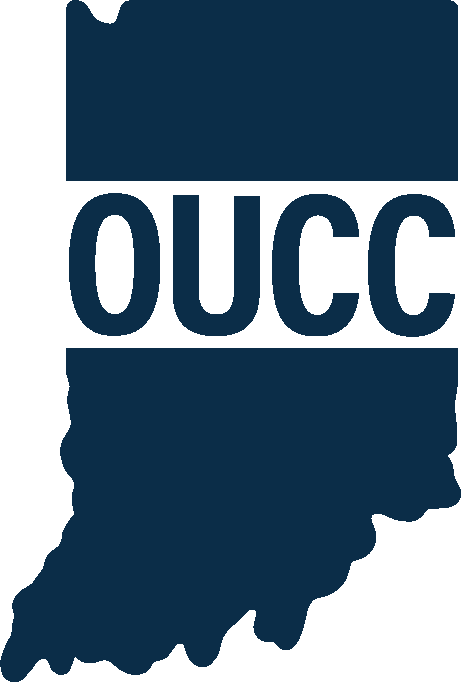Duke Energy received IURC permission to build a new generating station at Edwardsport, Indiana in 2007. Since then, the utility has sought rate recovery for the plant’s capital and operating costs in IURC cases as allowed by state law. In those cases, the OUCC and additional parties raised numerous concerns regarding the cost overruns and Duke Energy’s proposals to recover costs through rates.
The 618-megawatt integrated gasification combined cycle (IGCC) facility is designed to convert coal into a synthetic gas. Remaining nitrogen oxide (NOx), sulfur dioxide (SO2), and mercury emissions are removed from the gas before it is burned to generate electricity. The new facility replaced a 160-megawatt station at Edwardsport that had been in operation since the 1940s.
The IURC has approved two major settlement agreements that have capped the project’s costs and shielded ratepayers from nearly $1 billion in cost overruns. The agreements – approved in December 2012 and August 2016 – have resulted in consumer benefits including but not limited to:
- Guaranteeing that ratepayers will not be responsible for approximately 88 percent of the project’s construction costs above the amount the IURC approved in 2009.
- Ensuring that more than $984 million in construction and financing costs will be borne by shareholders rather than customers.
- An immediate $1 million rate credit to residential customers.
- $4.1 million in shareholder contributions to the Indiana Low Income Home Energy Assistance Program (LIHEAP), for the benefit of Duke Energy customers.
- $1.5 million in contributions from Duke Energy shareholders to the Battery Innovation Center in Greene County for additional renewable energy storage system research.
- A $500,000 shareholder contribution to the SUN solar energy grant program for development of solar energy projects for customers in Duke Energy’s Indiana service territory.
- $2.5 million in shareholder contributions to the Indiana Utility Ratepayer Trust.
- $250,000 to the OUCC to fund expert witnesses and related expenses.
- At least $35 million in annual rate credits through reduced depreciation rates. These credits will remain in effect after Duke Energy’s next base rate case and will not end until the conclusion of an additional, following rate case in the future.
- $32 million in additional annual depreciation expense reductions, which will take effect at the conclusion of Duke’s next base rate case.
- $22 million in annual customer savings due to deferred tax incentives.
- Assurances that Duke Energy ratepayers will not bear any costs for the company’s lawsuits against GE, Bechtel, or other project vendors or contractors.
The agreements also ensure that the Edwardsport plant’s assets will be valued at the capped costs for the life of the project, and that the values will not rise as they would in other circumstances. This will save ratepayers substantial dollars for years to come.
In addition, the agreements do not preclude the OUCC and other parties from objecting to future cost recovery requests if the plant does not perform at an acceptable level. The OUCC, in the meantime, will continue to monitor the plant’s performance and costs. This includes close scrutiny of Duke Energy’s multiple rate tracking filings to ensure that the utility only receives appropriate cost recovery, and receives it through the appropriate tracker mechanism.
- Duke Energy proposed the Edwardsport facility in 2006, requesting IURC approval to build and operate the project. The utility also requested approval to recover the project’s estimated cost of $1.985 billion through rates.
- Duke Energy revised the cost estimate to $2.35 billion in 2008. The IURC approved the revised estimate in January 2009.
- In November 2009, Duke Energy requested IURC approval for a new revised cost estimate of $2.88 billion.
- The OUCC filed testimony regarding the proposed cost revision on July 30, 2010, recommending a cap on project costs and expressing serious concerns about the project's cost increases and continuing inaccurate cost estimates.
- A settlement agreement filed in 2012 permanently capped the project's costs and provided a number of additional consumer benefits. The IURC approved this agreement in December 2012 with slight modifications.
- Duke Energy declared the Edwardsport project “in service” as of June 2013.
- The OUCC and additional parties challenged the “in service” date, with additional litigation addressing the recovery of testing and start-up costs.
- In September 2015, the OUCC, industrial customers, and Duke Energy reached an agreement providing an additional $85 million in ratepayer relief. This settlement was superseded by another agreement in January 2016, raising the relief to $87.5 million and including the Citizens Action Coalition of Indiana along with additional parties. This agreement received IURC approval in August 2016.
Until 2020, Duke Energy recovered its costs for the project through a billing component known as the IGCC rider. State law allowed the utility to ask the IURC to approve adjustments to the IGCC rider each year.
Rate recovery for the plant's operating and maintenance costs for 2018 and 2019 was considered in IURC Cause No. 43114 - IGCC 17. The IURC approved a settlement agreement among the OUCC, industrial customers, and Duke Energy that will result in $30 million in consumer bill credits and $1.7 million in shareholder funds for low-income energy assistance and renewable energy projects.
Under the utility's June 2020 rate case order, the plant's operating and maintenance costs are included in base rates.
All public documents in these cases, including formal testimony, are available by visiting the IURC website and entering cause number 43114.
